#bob wooler
Explore tagged Tumblr posts
Text
im going to start posting my titkoks
#paul mccartney#the beatles fanart#george harrison#ringo starr#john lennon#jane asher#bob wooler#the beatles#the beatles animatic#paul’s 21st birthday#video
110 notes
·
View notes
Text
get yourself a bestie who doesnt care if you send a man to the hopstial on their 21st birthday party
#john lennon#paul mccartney#lennon mccartney#paul’s 21st#bob wooler#classic rock#the beatles#beatles lore#seriously though
31 notes
·
View notes
Text
‘Good place to wash your hair, Liverpool. Nice soft water.’ (George Harrison) In 1977 there was an almighty row in Liverpool when councillors turned down a Beatle statue. They aren’t worthy of a place in our history,’ said one. The Beatles couldn’t sing for toffee,’ chimed another. Their behaviour brought tremendous discredit to the city.’ <…> Paul’s brother, Mike McCartney, offered a visionary solution: ‘Erect two separate statues. Rotten tomatoes could be thrown at one, and bunches of roses at the other.’ <…> The biographical facts of the Beatles’ link to Liverpool are well documented. What’s more interesting to disentangle is the relationship of their art. The danger is that you’re always trying to stuff the butterfly back into the chrysalis: to believe that everything the Beatles became was already there at the start, just waiting to be made manifest. That would be wrong. They became what they did because they were so open to the world around them, and to the experiences that came their way. And, ultimately, we should not try to explain away the magic. John met Paul, a chain of events followed, and unforeseeable splendours resulted. <…> The club [Cavern] was open at lunchtimes as well as evenings, but jazz was soon relegated to the weekends (and disappeared altogether in 1963). Of the Beatles’ shows, 150 took place during the day. One eye witness from 1961 is Geoff Davies, later the owner of Probe Records:
‘I saw the Beatles there about 78 times, and it was one of the most exciting things I’ve seen in my life. The first time I came across them was at an all-night jazz session, and we were horrified to find what we considered a pop band getting in on it. So we got a pass-out at the door to go down the pie stall at the Pier Head. I remember them starting up as we went out and I thought, What a fucking racket. ‘But the following week I went to a lunchtime session and there were the Beatles again. And that was it, everything changed for me. They used to do “Money” and extend the intro, really bloody heavy, and then Lennon comes in: “The best things in life are free,” in the dirtiest, foulest voice I’d heard in my life, full of hate and sneering and cynicism. I couldn’t believe the anarchy. The cheek of them. Everything I’d seen before had been like the Shadows, but the Beatles came on and they didn’t give a fuck: backs to the audience, the lot. In between the numbers they’d do TV jingles or any old nonsense, talking like the Goons. And the volume! It was still mostly trad ]azz at the time at the Cavern. But the Beatles had amps. ‘The concerts they did in Liverpool were completely different to what they did afterwards.’ It was never a luxury joint, more of a disinfected dungeon. The walls ran wet with perspiration. The toilets were squalid, obviously. But no one objected. It’s often forgotten how young the crowd could be at those clubs: like the old Marquee in London, the Cavern wasn’t licensed (hence the musicians’ need to get tanked up at the Grapes beforehand); the raw, pubescent energy of British beat was fuelled on orangeade. <…> Bob Wooler (who deplored the arrival ol liquor in later years) was the Cavern’s resident DJ, and a gifted quip-meister in the best tradition of Merseyside Surrealism. Already pushing 30, he was the scene’s hip uncle: his musical influence is incalculable. From 1960, when jazz gave way to rock’n’roll and Liverpool rock began to call itself beat music, Wooler ruled the roost, coming phrases like ‘Remember all you cave dwellers, the Cavern is the best of cellars.’ He could be a melancholy man sometimes: ‘Don’t spell my name “Wooller,” ’ he used to say. ‘There’s enough “1” in my life already.’ He came to call the Cavern’s location ‘Mythew Street’ on account of the miscQnceptions which grew up around it. (He denies, for example, that he announced Brian Epstein’s arrival at the club on the fateful day.) <…> There was intense interest in their hair. <…> Grown-ups were at first suspicious of long hair. To mothers in Liverpool it carried ancient connotations of poverty and neglect; to fathers it signified an effeminate rejection of man’s warrior nature. But the Beatles overcame all that. They were likely lads - no more and no less - and what’s more, their hair was cleaner than anybody’s.
(Paul McCaertney in Liverpool - Wondrous Place by Paul Du Noyer, 2002)
Part (I), (II), (III), (IV), (V), (VI), (VII), (VIII), (IX), (X), (XI), (XII), (XIII), (XIV), (XV), (XVI), (XVII), (XVIII), (XIX), (XX), (XXI), (XXII)
15 notes
·
View notes
Text
Sam Leach and Joan McEvoy's Engagement Party, 17th March 1962 🕺💃
Earlier in the evening, The Beatles performed at the Village Hall in Knotty Ash, Liverpool. The evening was billed as a "St. Patrick's Night Rock Gala". Sam Leach, (Liverpool concert booker) booked The Beatles and Rory Storm and The Hurricanes to draw a big crowd so that he could make enough profits to pay for his engagement party, scheduled to follow the night's show. Both bands attended Leach's party, which didn't end until the following afternoon. Also present at the party was Mike McCartney, Paul's girlfriend Dorothy 'Dot' Rhone, Brian Epstein, Bob Wooler and Ted 'Kingsize' Taylor.
In his book Sam Leach has a distinct memory of 'a gang of us' (presumably including Beatles and Hurricanes) travelling to the party from Knotty Ash in a van. Their driver (not Neil Aspinall) pulled out from the Village Hall into the path of a speeding articulated lorry which seemed to have appeared from nowhere. Everyone braced themselves for the inevitable impact but miraculously the lorry, its brakes screeching hysterically, managed to stop less than a foot from the side of the van. Shocked, stunned, shaken and stirred, everyone in the van travelled the 1.5 miles to the party in complete silence.
Hurricane Johnny 'Guitar' Byrne diary entry for 1962 mentions the party:
"Bought Zodiac. Knotty Ash, Orrell, then Sam Leach's engagement party. Had row with Eileen. Got home 6."
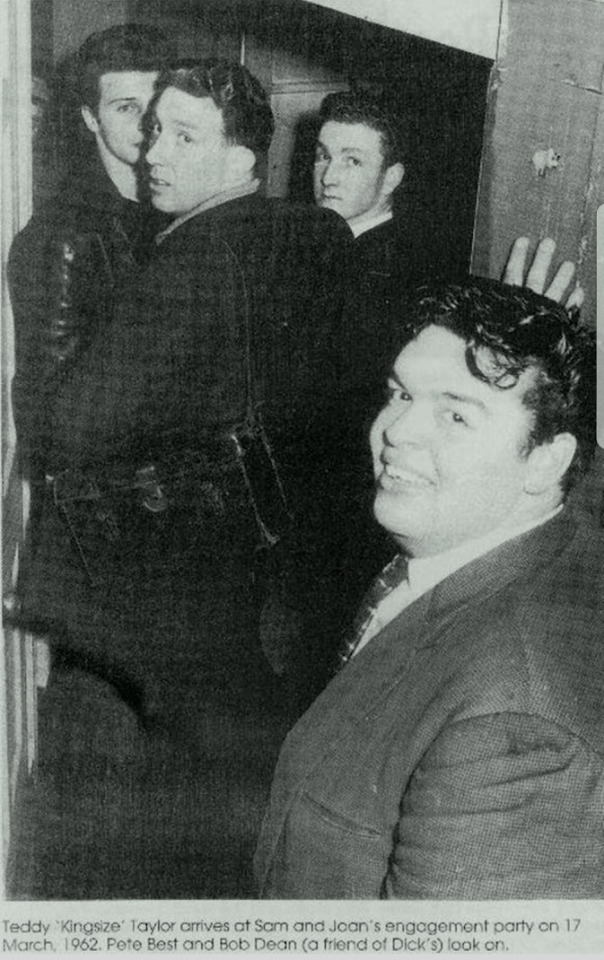
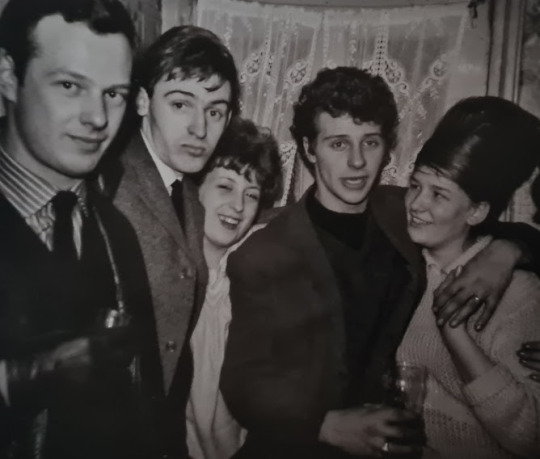
The party was at the family house in Huyton, thrown by Dolly, mother of Vera and Joan McEvoy.
"I can vouch for the fact that Brian fell in love with Vera and pursued her all night. In fact after the party he wrote more than one letter to Dolly asking her could she help him fix a date with Vera. Unfortunately for Brian she wasn't interested." Sam Leach (She seemed a little interested, as displayed below)
"Brown, who was married (but separated) at the time of her liaison with Epstein in 1962, describes him as "...very emotional. He always gave the impression of being cold and icy, but he was very softhearted, very tender, very gentle, and he had a lot of feelings. And he was all man, I don't care what they say." (Ray Coleman, The Man Who Made The Beatles)
"We’d been to the Knotty Ash Club for my sister’s engagement. The Beatles had played there, as did Rory [Storm] and a few other groups. Afterwards, as usual, we all went back to the house and Brian came along.
If you saw the Beatles in my mother’s they were just a scruffy bunch of boys. And who’d look at them? I wouldn’t bother with them but then Brian stood out and Brian looked like the real thing. He was handsome. He was tall. He was immaculate. That’s why I let Brian get behind the bar with me and help me serve the drinks. He was the best of the bunch.
So we were just behind the bar when Elvis came on, 'Heartbreak Hotel’. He loved it, I loved it, and we started dancing. There wasn’t much room. You know, you could go two steps forward, three steps back and that was it. So we sort of got a bit close and everyone was laughing at us, saying, like, 'What’s going on?’ But if you moved sideways you fell over the crates. There were crates of beer in there and everybody’s coats. We ended up on top of the coats or on top of the crates if we just moved the wrong way. And we got pretty close but I wasn’t surprised by the way he was acting towards me.
We were dancing and kissing at the same time. He was probably one of the sexiest fellas I had ever met. People say, 'Oh well, Brian was gay.’ but he wasn’t very gay with me. He was just like any other man and more. He was very easy-going and casual and funny. He’d make you laugh and he could dance. You know he could move. He said to me, 'I’ve seen you in different places and I thought you were stuck up.’ And I said, 'Well, I thought you were stuck up because I remember being in your shop and you were like the big boss.’
I think he was pretty fresh. In a house where people are looking at you it’s not like a club with all the lights out and people tend to be aware of others but Brian wasn’t that bothered. He was interested and he showed it. Maybe he’d had a bit too much to drink. I don’t know. But I can’t say that because I met Brian afterwards and he was still interested.
The next day he called round to the house. I wasn’t there so he talked to my mother about poetry. I don’t know how they got talking about poems but Brian came the following day with a book of poems for my mother with a little letter. He also gave her a letter thanking her for having the party because everyone had made such a terrible mess of the house. It was full of eggs and rubbish and bottles everywhere and he apologized for the actions of everybody else at the party.
Well, my mother just thought he was the most wonderful person in the world. At last a gentleman has come through this door and not Teddy boys and hooligans and all the rest of it. In the first letter he said he’d enjoyed meeting her, loved coming to the house, felt so welcome and would she mind if he came around again to see me. I said to my mum, 'Well, that’s impossible. How can I see him? You know I can’t go out with Brian.’ She said, 'You will have to’.
My mother was in love with Brian: 'He’s beautiful. He’s wonderful.’ So she sort of arranged it. I didn’t want him to come and pick me up at the house because I didn’t want people to see us going out. I arranged to meet him in a little cafe in Bold Street. We had a coffee and a chat and then I can’t really remember where we went. We went somewhere for a drink around Bold Street where there were all these little dives at the time. But I had to be back for nine o'clock. Another time I met him in the Tower and we had a little chat. We met in the back office and had a talk.
I liked Brian as a man and I think Brian liked me. But then he suggested if we were to go out we’d have to go to Southport or Manchester - anywhere out of Liverpool because he didn’t want to walk into my husband in Liverpool. We were separated at the time but it was a little bit awkward, you know.
It’s hard for me to believe Brian was gay. I think if I had been free and if I’d seen more of Brian I think we could have got serious. I think he was all man. I just can’t accept that he was gay.
In the shop Brian seemed like a man, like your dad shouting at you and superior. He had an attitude of superiority. But later on I discovered he was just like any other man. I thought he was a very passionate, loving person. He was like two different people. So if there’s a third person involved - this gay person - I just say he’s one hell of a man to be able to please everybody. You know, he was just unique. That’s all I can say." Vera Brown, In His Life, The Brian Epstein Story.
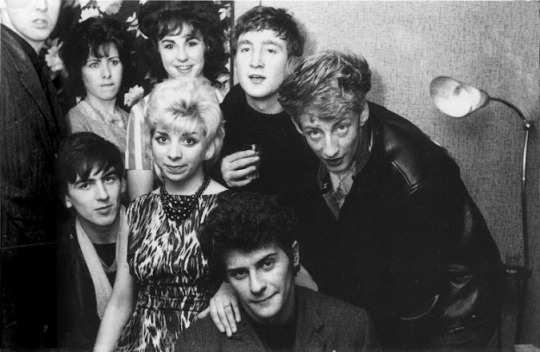


"George always fancied Joan and when I began dating her, he asked her to let him know when she finished seeing me. 'But don't tell Sam', he added. 'He’d batter me!' Today she probably feels like battering me for spoiling her chances." Sam Leach, The Rocking City
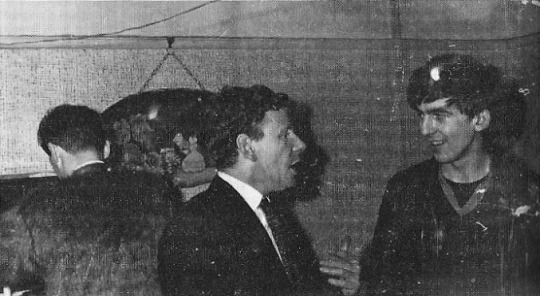

"Later in the evening, Joan had a headache and said she was going upstairs for a lie down. I went to fetch a couple of aspirins from the kitchen and said I'd follow her. Bob Wooler then made a typically cheap remark about pre-marital sex. Before I had a chance to sort him out, Paul and George grabbed him and made him personally apologise to Joan." Sam Leach, The Rocking City
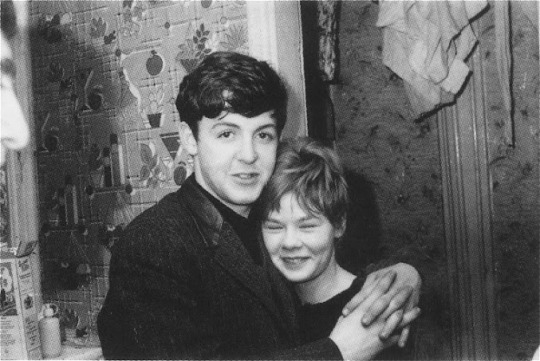
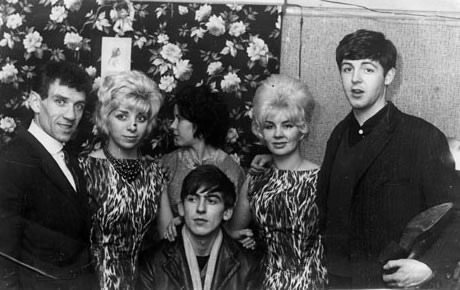
"Rory Storm was lying on the floor hopelessly drunk. He shouted up to Paul, 'I wanna be in the picture'. So, as you can see, Paul bent down and lifted his foot into the shot." Sam Leach
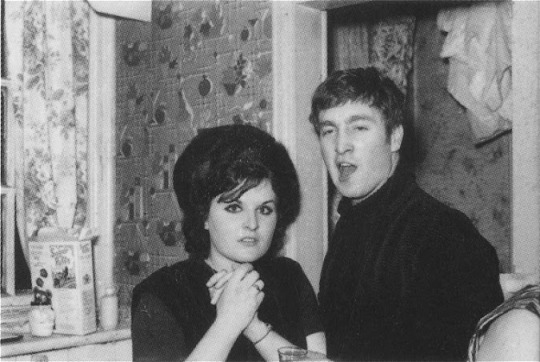
"The night rolled on and I found Lennon, completely sloshed, sitting in the kitchen rolling raw eggs down Ann Barton's birds-nest hairstyle. Each time one broke, he gave a gasp of astonishment at the gooey yellow mess spreading across the tiled floor. Dolly found out and gave him a severe rollicking, which sobered him up enough to utter a sincere, 'Sorry, Mrs Mac'. Everyone liked and respected Dolly McEvoy and that was the only time I ever saw Lennon genuinely humbled. He disappeared for a while after that and was found later fast asleep in the bath.
When he finally came downstairs, he once again started to apologise. Dolly had forgotten all about it, but he was still apologising as he left at nine the next morning. As we stood outside, he shook my hand gravely. 'That was the very best party I've ever been to . . . honest,' he croaked. I was pleased everyone had enjoyed themselves, but when John started thanking me for a third time, I put him in a taxi and packed him off home. As he left, I slipped an egg into his pocket. He never did tell me how that hatched out." Sam Leach, The Rocking City
#Paul McCartney#George Harrison#John Lennon#Pete Best#Sam Leach#photos by Sam Leach#quotes#Rory Storm#Joan McEvoy#Brian Epstein#Mike McCartney#Dot Rhone#Bob Wooler#Vera Brown#Ted Taylor#The Hurricanes#Paul#John#George#Brian
123 notes
·
View notes
Text
Lewisohn: rewriting history in the area where we trust him most – the songs performed
-In which Lewisohn rewrites a Beatles story and completely changes the songs sung, and coincidentally changes them in such a way so that if you know your Beatles trivia you'll think that Paul completely hogged the mic for two-thirds of the show-
Although I’ve come to a place where I’m more surprised to find a Lewisohn quote that turns out to be accurate than I am one that’s butchered, I have tended to believe that he is trustworthy on things like dates and songs performed. I’ve felt like that’s probably his anchor, and that he shapes the rest of his narrative around that.
But perhaps the habit of taking license cannot help but spread into other areas, because I am discovering that neither dates nor song lists turn out to be sacred with Mark Lewisohn.
As far as dates, that is part of a bigger piece that has been tangling me up for a few weeks, but his version of “the Beatmakers” performance shows that Mark Lewisohn will write what he wants, and that he has zero compunction in changing history to suit himself, regardless of subject.
In Chapter 22: “Right then, Brian — Manage Us,” a primary theme is that every promoter was done with the Beatles when Brian Epstein came along. Brian Kelly, especially, is given the role of being fed up with them, and Lewisohn uses “the Beatmakers” performance—Gerry and the Pacemakers and the Beatles going on stage together—as an example of how bad everything was just before Brian stepped in. (I do believe that Brian was a godsend, but that doesn’t mean that Lewisohn’s narrative is supported in every area, and in some places he stretches a lot more than in others. This is definitely one of those areas.)
Here’s the story: before going to the Litherland Town Hall performance, Bob Wooler had been drinking, maybe with the Beatles, and in Lewisohn’s version, Gerry seeing that they were all drunk sent “Gerry Marsden scuttling to the pub around the corner.” Every telling I’ve seen, one way or another, is in agreement that Gerry Marsden as well as Wooler had been drinking, and that the Pacemakers and the Beatles all played together with Wooler introducing them as “the Beatmakers.” Lewisohn adds some highly unlikely Preludin into the mix—“John, pissed and pilled…”—but I’m not going to take that on here.
Along with the chance to tell a riotously colorful story—one that in Lewisohn’s telling goes much farther than any of the source materials I’ve found—the main point of the tale is for Wooler to give us the climax of the—(all unsourced, other than this single, butchered Wooler quote)—frustration Lewisohn tells us promoter Brian Kelly was feeling: “Brian Kelly was fraught with anxiety over it. It was only a short episode and a bit of a shambles.”
The quote by Wooler that Lewisohn uses to try to prove his point, and the one and only reference he gives to support any of his “Brian Kelly fed up/Epstein must save Beatles” narrative is a modification of one of those Lewisohn monsters I call a “donut.” (There’s a hole in the middle. However in this case, as in many others, he also adds words that were never spoken.)
THE ACTUAL WOOLER QUOTE:
“Brian Kelly was fraught with anxiety over it, but the audience liked it. It was a bit of a shambles really, so I lowered the curtain on the proceedings.”
LEWISOHN’S REWRITE:
“Brian Kelly was fraught with anxiety over it. It was only a short episode and a bit of a shambles.”
And while I am very interested in what Lewisohn is using for his Brian-Epstein-saved-the-Beatles-but-Paul-tried-to-thwart-him narrative, I felt the need to pause to look at Lewisohn’s massive and nonsensical alterations to this performance, especially in the songs the improvised combo-band played. (And yet how very authoritatively Lewisohn does it.)
The whole section has problems, but let us deal with the songs.
Mark Lewisohn says they “thundered through four numbers”—
The Beatmakers thundered through four numbers—“Whole Lotta Shakin’ Goin’ On,” “What’d I Say” (extended mix), “Red Sails in the Sunset” and the new Ray Charles record “Hit the Road Jack”—during which John, pissed and pilled, slid from the piano and slumped on the stage.
—‘Tune In,’ Lewisohn – Chapter 22 (Emphasis mine.)
Sticking to the songs, the page referenced in the footnote first quotes Bob Wooler:
“They did a few numbers like ‘Hit The Road Jack’, swopping instruments and the like.”
—FOOTNOTE 9: ‘The Best of Fellas’ – Bob Wooler (Emphasis mine)
Then the next paragraph quotes Gerry Marsden, and I’m going to add boldface to the songs he says they played:
“It worked very well as we all knew the same songs and all played the same songs. Paul, John and I took turns on the piano and Les played the sax. We did ‘Roll Over Beethoven’, ‘Johnny B. Goode’, ‘Great Balls Of Fire’, ‘Pretend’, ‘Blueberry Hill’, ‘I’m Walkin'’ and ‘Sweet Little Sixteen’, probably some others too.”
—FOOTNOTE 9: ‘The Best of Fellas’ – Gerry Marsden (Emphasis mine)
So, either they performed exactly four numbers, including an “extended mix” of Paul wailing ‘What’d I Say,’ —or— they performed at least eight numbers and “probably some others, too.”
“The Best of Fellas” version from Bob Wooler and Gerry Marsden that is referenced in the footnote makes sense in ways that Lewisohn’s rewriting doesn’t. Marsden begins by saying that they all knew the same numbers, and moreover what Lewisohn is telling us is that Paul took over the mic for three out of four numbers, and went so far in his spotlight-hogging selfishness as to sing an “extended version” of ‘What’d I Say.’ It’s a particularly egregious “if you know, you know” insertion that conjures up a very damning image of Paul in this otherwise “mutual mood of cooperativeness.” But not only is Lewisohn’s song list not supported, if Paul had hogged the spotlight that way it’s only reasonable to believe that Marsden would have remembered that, and certainly wouldn’t have described the collaboration in the way he did. And if Paul was hogging the mic and spotlight and had sung song after song where he was the lead, Marsden absolutely, positively, would not have rolled off a list of songs that didn’t include a single, solitary Paul song. That is simply beyond belief.
Gerry Marsden’s recollection also makes a lot of sense in that it’s natural that he would best remember the songs where he sang lead. And indeed, out of the seven songs he names, four are Pacemakers’ songs. (Including the one Wooler names and Lewisohn decides to agree with: “Hit the Road, Jack.”) And none of the songs anyone names are songs where Paul sings lead. Two are John songs and the other is a George song, which lends credence to Gerry Marsden’s “probably some others, too” comment, because it’s likely that there was at least one song where Paul was lead.) But in Lewisohn’s seemingly fabricated four-song list, other than “Hit the Road, Jack” they’re all Paul numbers. So not only does Lewisohn choose to have Paul singing an extended version of a scene-stealing “What’d I Say” but he slyly tells us that Paul basically hogged the microphone for seventy-five percent of the numbers (and even more of the time) that this “cooperative” was on stage together. Now, if you’re not a hardcore fan with a fair amount of knowledge this will probably slip past you, but if you’ve got a dog in this hunt, and especially if you already think Paul McCartney is a self-obsessed prima donna, you’ll get the picture Lewisohn is so deliberately painting. And I write deliberately very—well, deliberately—because if a writer makes the decision to veer away from the record and create a very specific, very limited, and very fictional song list for an anecdote about two groups deciding to get together and sing, and more than two-thirds of the songs chosen for the historical rewrite are Paul songs—and then that writer even goes to the trouble of telling readers that Paul sang an “extended mix” of one of those songs—then of course it’s deliberate. Lewisohn didn’t choose his reinvented song list at random out of a Bingo cage.
Here are the songs referenced in the footnote versus the songs that Lewisohn says they sang.
SOURCE MATERIAL SONG LIST/USUAL LEAD:
“Hit the Road Jack” ✓ /Gerry Marsden
“Roll Over Beethoven”/George
“Johnny B. Goode”/John
“Great Balls Of Fire”/Gerry (and Paul?)
“Pretend”/Gerry Marsden
“Blueberry Hill”/Gerry Marsden
“Sweet Little Sixteen”/John
“I’m Walkin'”/Gerry Marsden
LEWISOHN’S SONG LIST/USUAL LEAD:
“Hit the Road Jack” ✓ /Gerry Marsden
“Whole Lotta Shakin’ Goin’ On”/Paul
“What’d I Say” (extended mix)/Paul
“Red Sails in the Sunset”/Paul
----
P.S. If you haven't been reading all of @wingsoverlagos 's work, you absolutely have to. She's done so much and Lewisohn's inventions are so much worse than I realized.

#the beatles#beatles#mark lewisohn#lewisohn is making stuff up again#dr frankenquote#lewisohn#the beatmakers#bob wooler#fine tuning#tune in#paul mccartney#john lennon#gerry and the pacemakers#the best of fellas
32 notes
·
View notes
Text
12 December 1962
Bob Wooler goes onstage at the Cavern to tell the audience that, due to a winter storm, one act will not be appearing this evening.
That act, however, is not the Beatles but some folk duo so no one cares.
20 notes
·
View notes
Text
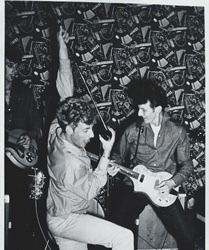
Rory Storm and Johnny Guitar, possibly 1961 in Butlins
“Rory Storm was far more show than substance. He learnt his tricks from watching Elvis Presley and Gene Vincent. He had little originality but was a very good copycat. He would cock his leg over the mike like Gene Vincent and cover his songs like ‘Rocky Road Blues’. I will never forget him knocking the Reslo mike over at Holyoake: his foot hit the mike, which was the only one we had. I thought, ‘Oh god, I hope he hasn’t ruined it’, and, fortunately, he hadn’t. I told him that he must never do that when we are down to one mike. If you glanced at some of the early photographs of Rory Storm doing tricks with his mike stand, you might think it was a young Rod Stewart.” - Bob Wooler
23 notes
·
View notes
Text
August 31, 1961: Bob Wooler predicts the Beatles’ future in Mersey Beat
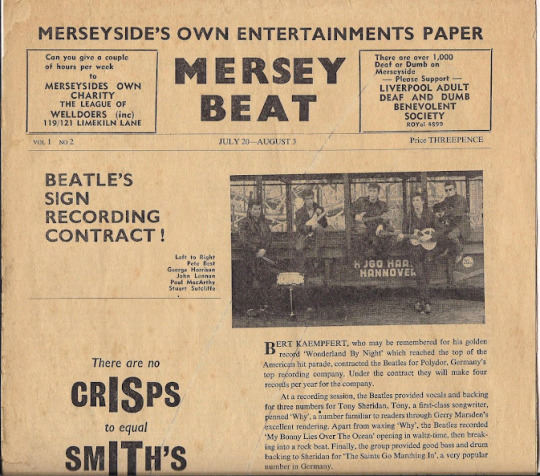
A PHENOMENON CALLED THE BEATLES!
by Bob Wooler [x]
Why do you think The Beatles are so popular? Many people many times have asked me this question since that fantastic night (Tuesday, December 27th, 1960) at Litherland Town Hall, when the impact of the act was first felt on this side of the River. I consider myself privileged to have been associated with the launching of the group on that exciting occasion, and grateful for the opportunities of presenting them to fever-pitch audiences at practically all of the group’s subsequent appearances prior to their last Hamburg trip.
Perhaps my close association with the group’s activities, both earlier this year and since their recent reappearance on the Merseyside scene, persuades people to think that I can produce a blueprint of The Beatles Success Story. It figures, I suppose, and if, in attempting to explain the popularity of their act, the following analysis is at variance with other people’s views, well that’s just one of those things. The question is nevertheless thought-provoking.
Well then, how to answer it? First some obvious observations. The Beatles are the biggest thing to have hit the Liverpool rock ’n’ roll setup in years. They were, and still are, the hottest local property any Rock promoter is likely to encounter. To many of these gentlemen’s ears, Beatle-brand noises are cacophonous on stage, but who can ignore the fact that the same sounds translate into the sweetest music this side of heaven at the box office!
I think The Beatles are No. 1 because they resurrected original style rock ’n’ roll music, the origins of which are to be found in American negro singers. They hit the scene when it had been emasculated by figures like Cliff Richard and sounds like those electronic wonders The Shadows and their many imitators. Gone was the drive that inflamed the emotions. This was studio set jungle music purveyed skillfully in a chartwise direction by arrangement with the A & R men.
The Beatles, therefore, exploded on a jaded scene. And to those people on the verge of quitting teendom—those who had experienced during their most impressionable years the impact of rhythm ’n’ blues music (raw rock ’n’ roll)—this was an experience, a process of regaining and reliving a style of sounds and associated feelings identifiable with their era.
Here again, in The Beatles, was the stuff that screams are made of. Here was the excitement—both physical and aural—that symbolized the rebellion of youth in the ennuied mid-1950’s. This was the real thing. Here they were, first five and then four human dynamos generating a beat which was irresistible. Turning back the Rock clock. Pounding out items from Chuck Berry, Little Richard, Carl Perkins, The Coasters and the other great etceteras of the era. Here they were, unmindful of uniformity of dress. Unkempt-like long hair. Rugged yet romantic, appealing to both sexes. With calculated naivete and an ingenious, throw-away approach to their music. Affecting indifference to audience response and yet always saying “Thank-you.” Reviving interest in and commanding enthusiasm for numbers which descended the Charts way back. Popularizing (more than any other group) flipside items—example, “Boys.” Compelling attention and influencing, wittingly or unwittingly, other groups in the style, choice and presentation of songs.
Essentially a vocal act, hardly ever instrumental (at least not in this country), here they were, independently minded, playing what they liked for kicks, kudos and cash. Privileged in having gained prestige and experience from a residency at the Hamburg Top Ten Club during the autumn and winter of last year. Musically authoritative and physically magnetic, example the mean, moody magnificence of drummer Pete Best—a sort of teenage Jeff Chandler. A remarkable variety of talented voices which song-wise sound distinctive, but when speaking, possess the same naivete of tone. Rhythmic revolutionaries. An act which from beginning to end is a succession of climaxes. A personality cult. Seemingly unambitious, yet fluctuating between the self-assured and the vulnerable. Truly a phenomenon—and also a predicament to promoters! Such are the fantastic Beatles. I don’t think anything like them will happen again.
———
Retrospective from Bill Harry, Editor of Mersey Beat [x]
Editor’s note: Cavern disc jockey Bob Wooler, a Mersey Beat columnist, penned this piece in the August 31 1961 issue of Mersey Beat. How prophetic his last sentence proved to be! In recent years I told Bob I intended to revive Mersey Beat and I wanted him back in the fold as a columnist. Sadly, he died early in 2002 while I was still panning the website.
There are one or two things I would like to point out. The main advertisement on this page was for NEMS record store. Apart from the fact that I regularly discussed the Beatles and the Mersey scene with Brian Epstein each time I dropped copies to him, in addition to the fact that he began to review records for me from Issue No. 3, it is obvious from the sort of coverage, such as this article, which the Beatles were receiving every issue, that Epstein was aware of the Beatles from Mersey Beat and not some youngsters asking for a record in his store some months later. Bob also mentions the impact the group made at Litherland Town Hall. It was Bob who persuaded promoter Brian Kelly to book them for their debut appearance there on that date. It's also interesting to note that the only member of the Beatles mentioned by name is drummer Pete Best. Bob nicked the 'mean, moody, magnificent' tag from Howard Hughes' description of Jane Russell in the movie 'The Outlaw.' As this article was published in 1961, Bob did get something wrong: he mentions a residency at the "Hamburg Top Ten Club during the autumn and winter of last year." They only had residencies at the Indra and Kaiserkeller in 1960, although they made a few appearances at the Top Ten (Their Top Ten residency didn't actually commence until 1961).
#the beatles#bob wooler#1961#mersey beat#august 1961#newspaper clippings#beatles and the press#the humble beginnings#as transcribed in tune in#havent seen this one anywhere on here#been looking for the clipping but havent found it#if youve seen it give a shout#oh found the copy on the mersey beat archives#have to get bill harrys note bc its a great example of how a good story works#not a clipping tho so an august beatles cover is the closest i can get#litherland#december 1961#hamburg era#brian epstein#bill harry#ran into crit bill harry got from other liverpool bands during the early merseybeat days bc he would write so much about the beatles#so its impossible the beatles had missed brians radar before the my bonnie record request#‘beatles sign recording contract’ aww they mean the german label printed my bonnie how cute
26 notes
·
View notes
Text
Wednesday 19 June
Brian Epstein told John to send the injured Wooler a telegram apologising for his behaviour. It read, ‘Really sorry Bob. Terribly worried to realise what I had done. What more can I say?’ The group, minus John, took the train to London to record their second appearance on Easy Beat at the Playhouse Theatre. Epstein told a contrite John he had to go, packing him off on a later train.
Maureen O’Grady spoke with Paul, George, Ringo and Brian Epstein before the recording. John finally arrived with Cynthia, who was dressed in black from head to toe and wearing dark glasses. The session lasted from 8.45pm to 9.45pm and the group performed ‘Some Other Guy’, ‘A Taste Of Honey’, ‘Thank You Girl’, and ‘From Me To You’. An attack of the giggles meant they had to record everything twice. The show aired the following Sunday.
Thursday 20 June
John’s telegram was sent from Covent Garden at 6.10pm to Wooler at his flat in Canning Street, Liverpool.
Friday 21 June
The latest NME carried a thank you from Paul in the form of an ad, which cost him £ 15: ‘TO MANY PEOPLE-Thank you very much for your Gifts and Greetings on my Birthday… Great! PAUL McCARTNEY!”
The Beatles 1963 by Dafydd Rees
*
Eight years later I know, but was Too Many People also a sort of call back to this week, where John had been a mess at Paul’s 21st? Also I’ve only just noticed ‘too many people’ is an aural pun.
#the beatles#paul mccartney#john lennon#george harrison#ringo starr#the beatles 1963#too many people#dafydd rees#bob wooler#NME
33 notes
·
View notes
Text
Bob exploded when he saw this: "This is preposterous," he said, "Absolute nonsense. Goldman sees that the party was in the garden and rushes to the conclusion that all the garden implements are to hand. He'll have me buried in the rose bushes next."
Bob Wooler's reaction to Albert Goldman's telling of the fight with John. (From The Best of Fellas, Spencer Leigh)
12 notes
·
View notes
Text
I got hold of Spencer Leigh's book on Bob Wooler just to find the context for the Leopold and Loeb quote (for reasons), and now I have also learned that Bob Wooler absolutely hated Bob Dylan and had a weird love-hate double act with Allan Williams at Beatles conventions
3 notes
·
View notes
Text
Curiously, Pete Shotton claims John regretted not meeting Noel Coward:

The Beatles & Noël Coward
The songwriting ambitions of Wooler and the Lennon-McCartney team provided a rich topic of conversation. "I used to discuss this chiefly with Paul," said Wooler. "I did discuss songs with John, but he wasn't interested in my kind of songs. Whereas Paul McCartney was interested in what I had to say about songs, and Noël Coward, for instance. I talked to him about Noël Coward and how clever and how witty he was. And this is what I miss about rock'n'roll songs, the absence of wit. There's so very few of them have any wit about them. Which is very sad. They're all rather long-suffering, these songs. And all this pall rather appalled me. 'When I'm Sixty-Four' is really, I think, the only witty Beatles song, which is essentially a McCartney number. When I used to announce Paul at the Cavern, occasionally I'd say, 'Now Paul's going to sing a song of his own he's written; he's the Noël Coward of rock'n'roll!' I think he liked that appellation, that description."
- Gillian G. Gaar, 'I AM THE DJ: AN INTERVIEW WITH THE CAVERN'S BOB WOOLER', Goldmine (8 November 1996)
John and Paul meet Noël Coward at Alma Cogan's party at her London apartment, 1-4 June 1964.*
[Coward] found them 'pleasant young men, quite well behaved and with an amusing way of speaking'. [...] Though [Coward's] background was not so very different from the Beatles' - his father was an impoverished piano salesman - he swiftly assimilated into high society, readily adopting the mannerisms and accents of the English upper classes. Small wonder, then, that the current rise of working-class culture held so little appeal for him. [...] Coward made the mistake of relaying his encounter with John and Paul, in derogatory terms, to David Lewin of the Daily Mail. It never occurred to him that Lewin would quote him in print complaining that the Beatles were 'totally devoid of talent. There is a great deal of noise. In my day, the young were taught to be seen but not heard - which is no bad thing.'
- Craig Brown, One Two Three Four: The Beatles in Time (2020)
(*Craig Brown dates this meeting as 6 June, however the Beatles - minus Ringo - were in Amsterdam on this date, and the party was in London. Lewin's article is published on Friday 5 June 1964 and refers to Coward's 'last day' of his visit to Britain 'this week' - therefore more likely 1-4 June.)
A year later, Coward sees the Beatles in concert at the Teatro Adriano in Rome, 27 July 1965, and afterwards goes to meet them at their hotel.
PAUL: Brian came and said, 'Noel Coward would like to meet you boys.' We all said, 'Oh, fucking hell, no! No, no, no. I'm going to bed.' Nobody was really keen, we were better just casually interacting with people. Once you actually had to meet them, it became a bit official and our black humour would kick in and we'd try and counteract the fact that four of us were going to have to line up to meet the great man, so piss-takes would come fairly readily. No one was going to go, and Brian said, 'You can't, you just can't!' So I went down and met him. But then he said some not too pleasant things about us after that, so fuck him anyway.
- Paul in Barry Miles, Many Years From Now (1997)
...I was told that the Beatles refused to see me because that ass David Lewin had quoted me saying unflattering things about them months ago. I thought this graceless in the extreme, but decided to play it with firmness and dignity. I asked Wendy [Hanson, the Beatles' publicist] to go and fetch one of them and she finally reappeared with Paul McCartney and I explained gently but firmly that one did not pay much attention to the statements of newspaper reporters. The poor boy was quite amiable and I sent messages of congratulation to his colleagues, although the message I would have liked to send them was that they were bad-mannered little shits.
- Noël Coward's diary entry for 4 July 1965, referring to 27 June. (x)
38 notes
·
View notes
Text
Impressively, the Liverpool scene was big enough to support its own weekly music paper, Bill Harry’s Mersey Beat, which he’d begun at art college after switching allegiance from jazz to rock’n’roll:
‘I was writing to the Daily Mail saying what is happening in Liverpool is amazing, it’s like New Orleans at the turn of the century, but with rock’n’roll bands instead of jazz. No answer, of course. And the Liverpool Echo didn’t do anything on the scene. The advertising column on their front page said ‘Jazz’, and no matter how much the clubs asked them, the Echo would not change it to feature rock’n’roll. And all the Northern media was based in Manchester: though Liverpool had a larger population, all the news was Manchester-biased. Bob Wooler and I made a list of 300 local bands, yet no one knew about anything outside their own immediate neighbourhood.’
Mersey Beat became the grapevine that allowed a coherent scene to develop. ‘I didn’t know what to call it. But I pictured our coverage as like a policeman’s beat. So I thought Mersey Beat. It was purely that: the word beat wasn’t used for the music at the time. The venues were called jive hives and the groups were called rock’n’roll groups. The Beatles’ name was not taken from the beat of the music but from John and Stuart saying they should be an insect name like Buddy Holly’s Crickets. So it became Beetles and John thought of putting the “a” in it.
‘Groups then started calling themselves beat groups. The whole city became aware of the music, with Mersey Beat coming out. Suddenly in the tailors’ shops you had the dummies with guitars. You saw all these groups’ vans in the streets now: they started travelling all over the region.’
Harry took his brainchild to the local venues and shops, including NEMS: ‘In July 1961 Brian Epstein ordered twelve dozen copies of issue number two, an incredible amount for a provincial record shop. The entire front cover was about the Beatles recording in Hamburg. And I got John to write a piece for me which I called “On the Dubious Origins of The Beatles. Translated from the John Lennon.” He was so delighted he gave me everything he’d ever written, about 250 poems, stories, drawings, and I used them as a column called Beatcomber.
‘Epstein got so excited by the paper he asked if he could be my record reviewer, and his reviews appear in issue three. He took advertising, and the only other thing on the NEMS page was a piece by Bob Wooler on the Beatles, saying they were musical revolutionaries. Every time I dropped copies around to NEMS, Brian would call me into his office, offer me a sherry and want to know all about it. He saw something in this scene on his own doorstep. He asked me to arrange for him to go to the Cavern. In his book he comes up with this thing about a guy coming into the shop and asking for “My Bonnie” but he’d been discussing the Beatles with me for months already.
‘I was in the office all the time: I did the wnting, design, advertising, circulation, the lot. At times 1 was working 100 hours a week, collapsing with the blood coming out of my nose. Did an interview with the Swinging Blue Jeans once, they had to get an ambulance and take me to hospital.
‘There was an amazing folk scene, too, and the biggest country music scene in Europe. Add the poetry and the black music scenes, and it was incredible what was happening in that city. I don’t think it ever happened anywhere else. You get books saying, “Oh, as soon as the Beatles happened, everyone was suddenly on the streets with guitars.” But the whole thing happened prior to that.’
(Liverpool - Wondrous Place by Paul Du Noyer, 2002)
Part (I), (II), (III), (IV), (V), (VI), (VII), (VIII), (IX), (X), (XI), (XII), (XIII), (XIV), (XV), (XVI), (XVII), (XVIII), (XIX), (XX), (XXI), (XXII)
5 notes
·
View notes
Text
Beatle events 4
Paul's 21st birthday



#requests open#makz artz#the beatles#paul mccartney#john lennon#beatles#beatle events#comic#the beatles fanart#beatles fanart#fanart#fan comic#dj bob wooler#my art
94 notes
·
View notes
Text
best part abt mclennon is the absolute wild things in the Lore that are such common knowledge we barely post about them so when anyone not insane hears about it and loses it it's like. huh? what? oh yeah I guess that's kind of wild. anyway-
20 notes
·
View notes
Text
people saying 1964 john would be any more discontented with being called bisexual as if he didn't play openly with the idea for his whole life with his attitude towards it depending on the time of day is so strange to me tbh
#actually now that i think about it it was probably a matter of having it in control like#whenever he hinted at it himself people would go like 'he's so heterosexual he's obviously messing around! he's so funny!'#but when people made those remarks themselves ie bob wooler without john controlling the situation he obv didn't like it#not to say i think he'd be even more antagonistic towards it in 1970 with the janov thing etc etc#he contains multitudes as usual#rambling#john
4 notes
·
View notes